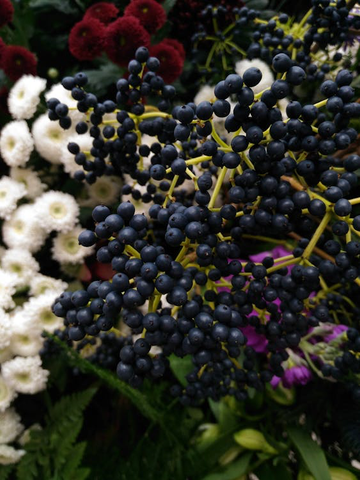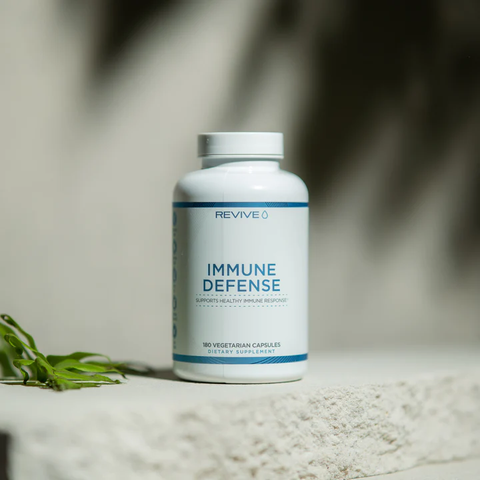Can You Take a Multivitamin and Elderberry Together? Your Comprehensive Guide
Elderberry is an age-old remedy that’s especially great for boosting the immune system due to its antiviral properties. People have relied on it for centuries to fight off colds, which may have you thinking: “Well, maybe I should take an elderberry supplement with my daily multivitamin.” If you’re asking this question, then you’re in the right place!
Research shows that elderberry can help fight viruses and reduce inflammation. It’s also good for your heart health and digestion. Is it safe to eat elderberry (or take an elderberry supplement) every day, though? And can you take a multivitamin and elderberry together? We’ll be exploring these questions in this article, so don’t go anywhere!

What Is Elderberry?
Elderberry, as you may have guessed, comes from the fruit of the black elderberry plant (scientifically known as Sambucus nigra). These berries, which are usually dark blue or black, are rich in vitamins that support the immune system, like vitamin A and vitamin C. For this reason, a lot of people choose to take elderberry supplements to fight off colds.
Eating raw elderberries directly from the plant can be harmful because they contain toxins, so be careful! Once they’ve been processed, however, elderberries become safe to eat and offer a surprising number of health benefits. This is why you'll often find elderberry in dietary supplements, like Revive’s Immune Defense.

It's perfectly fine to take elderberry daily as a supplement. We’d recommend it. Besides supplements, elderberry is used to make products like elderflower or elderberry juice, wine, tea, and jam. While these products are quite delicious, they tend to contain added sugars, so they’re not especially healthy.
The Benefits of Elderberry
If you’ve ever had toast with elderberry jam, you know how tasty it is. Nothing goes better with fruit salad and a spot of elderberry tea! The taste of this remarkable berry only scratches the surface of its benefits, though. Let’s take a closer look at the main benefits of eating elderberry products or taking elderberry supplements below:
High in vitamin C
One serving of elderberry contains 52.2 milligrams (mg) of vitamin C. This vitamin is super important for a strong immune system, helps prevent sickness, and can even speed up muscle recovery after you exercise. Vitamin C is also important for repairing tissues and reversing damage caused by free radicals. It also keeps your skin clear and healthy, which is always a plus!
Lowers inflammation and stress
The ability of elderberries to fight inflammation (due to their high antioxidant content) might also help to lower your stress levels and improve your mood over time. Flavonoids ( a type of polyphenol found in elderberries) could help decrease inflammation in the brain and promote a healthy gut, too.
Plenty of antioxidants
Elderberry juice made from fresh berries is rich in antioxidants such as protocatechuic and chlorogenic acid, as well as beneficial plant nutrients called phytonutrients. Among these phytonutrients are flavonoids like quercetin and rutin.
Flavonoids help reduce inflammation in the body and protect cells from oxidative damage. This is important because oxidative damage can contribute to serious health issues, including heart disease, diabetes, cancer, and cognitive disorders like dementia and Alzheimer’s.
Improves heart health
Did you know that eating elderberry products or taking elderberry supplements is good for your heart health? The reason for this is that elderberry contains phytonutrients and fiber that can help lower cholesterol levels in the bloodstream.
These substances bind to cholesterol, removing it from the body. Elderberry may also help decrease blood pressure by reducing uric acid levels in the blood. High levels of uric acid are often linked to the development of hypertension.
Improves lung health
Although research hasn't definitively linked elderberry to chronic lung conditions, elderberry does contain quercetin, a flavonoid and antioxidant that’s known to support lung function. This is especially good news for people with asthma and chronic obstructive pulmonary disease (COPD).
One study suggested that elderberry when combined with other compounds, might help relieve symptoms in people with COPD. However, further research is necessary to fully understand the effects of elderberry on a person’s lungs.
High in fiber
The fiber in elderberry is good for your gut. Not only does it help with digestion, but it keeps your immune system strong, too. It promotes gut health because it contains prebiotics, a type of fiber that feeds the beneficial bacteria in your gut (known as probiotics).
A single serving of elderberry has around 7 grams of fiber, which is about a quarter of the recommended daily amount. Since a lot of people don't get enough fiber in their diets, taking elderberry supplements can be very helpful for most people who are looking to stay healthy.
Eases cough and sore throat
Studies have shown that elderberry can help lessen the length and seriousness of colds, the flu, and other respiratory infections when taken in lozenge or extract form. The best results were seen when elderberry was taken within 48 hours of the start of symptoms.
Combining elderberry with other ingredients might also help treat a cough. A study in the Journal of Dietary Supplements recommends gargling with a mixture of elderberry, lemon juice, honey, sage, and vinegar.
Can You Take a Multivitamin and Elderberry Together?
Taking both a multivitamin and elderberry together is typically quite safe. As you probably already know, multivitamins contain plenty of essential vitamins and minerals that support different functions in your body — like repairing tissues and improving heart health.
Elderberry supplements are packed with antioxidants, which may react with the vitamins and minerals in your daily multivitamin in a few different ways (which we’ll talk about in more detail below). Elderberry also contains a lot of nutrients, including vitamins A, C, and B6, as well as minerals like potassium and iron. These nutrients complement the vitamins and minerals that are typically found in multivitamins.
It’s been shown that elderberry interacts positively with the specific vitamins found in multivitamins. Using vitamin C as an example, due to the high vitamin C content in elderberry, taking elderberry supplements could potentially help your body absorb the iron from multivitamins. Your body needs to be able to absorb iron efficiently so that you don’t get anemia (an iron deficiency).
No matter what, you’re going to want to consult with a healthcare professional before taking elderberry supplements (or even multivitamins for that matter). While combining them is generally safe for most people, individual health conditions, medications, and dietary needs should be taken into consideration.
For example, people with autoimmune diseases or those who are taking immunosuppressive medications should be cautious when it comes to taking elderberry supplements, as they may stimulate the immune system and make symptoms worse.
Are Elderberries Safe to Eat?
While it’s been proven that taking elderberry supplements comes with several potential health benefits, there are some risks that you’ll want to keep in mind — especially when it comes to eating the berries themselves. The bark, unripe berries, and seeds of the elderberry plant contain small amounts of lectins, which can cause digestive issues if eaten in huge amounts.
Elderberry also contains cyanogenic glycosides, which can release cyanide under specific conditions. Fascinatingly, this toxin is also found in apricot seeds and almonds. Fresh elderberries contain 3 mg of cyanide per 100 grams, while fresh leaves contain 3–17 mg per 100 grams.
Of course, commercial products and cooked berries don’t contain any cyanide, so you shouldn’t have to worry about that. The potential side effects of consuming raw elderberries, leaves, bark, or roots tend to include nausea, vomiting, and diarrhea.
Thankfully, cooking elderberries can effectively remove toxic substances. If harvesting elderberries yourself, make sure that you’re able to identify the American and European elderberry species, as other varieties may be more toxic. You should always remove any bark or leaves before you use elderberries to cook, too.
It’s also worth mentioning that elderberry is not recommended for children, adolescents under 18 years old, pregnant women, or breastfeeding women. Although there have been no reported adverse effects in these groups after eating elderberries, there isn't enough data to confirm that they’re safe.
How to Incorporate Elderberries Into Your Diet
Whether you’re looking for a new type of berry to put into your smoothie, or want to experiment with a new type of scone, incorporating elderberries into your diet is pretty easy. Keep in mind that you can also take elderberry supplements (along with your daily multivitamin!) if you want to experience the health benefits of elderberry firsthand.

Drink elderberry tea
There are few things more comforting (and healthy) than a mug full of elderberry tea. Add a little bit of honey for some extra sweetness, and cuddle up under your favorite blanket. It’s a good idea to drink elderberry tea if you feel like you’re about to get sick!
Make elderberry jam
What goes well with elderberry tea? Toast with elderberry jam, of course! Not only is elderberry jam delicious, but it’s healthy, too (as long as it doesn’t have a bunch of sugars or artificial sweeteners added to it).
Elderberry pastries
If you’re looking for a healthy dessert, you might want to try making some elderberry lavender scones or even an elderberry tart. If you’re the type that likes to bake and experiment in the kitchen, this is the perfect project for you! Just make sure to be careful if you’re picking the elderberries yourself.
Start Taking Elderberry Supplements with Revive MD Today
A lot of people wonder whether you can take elderberry with multivitamins, and we’re here to tell you: that it’s perfectly safe for most people. Once again, though, if you’re pregnant or breastfeeding, you’ll probably want to hold off on the elderberry supplements.
Revive MD has plenty of supplements available, including supplements that contain elderberry. All of our products have been third-party purity tested, so you can rest assured that you’ll be getting all of the health benefits you need while also staying safe.
If you have any questions, feel free to contact Revive MD — or simply check out our wide selection of supplements for organ health, stress relief, and more. Your health journey can start as soon as today!
The information being presented in this blog is intended to be used as educational or resource information only. It is not intended to be a substitute for medical advice from your healthcare provider. This content should not be used for the diagnosis or treatment of any medical condition. If you have any questions or concerns about your health, please contact your healthcare provider. You should call 911 for all medical emergencies. Revive MD is not liable for any advice or information provided on this blog, which advice or information is provided on an “as-is” basis, and assumes no liability for diagnosis, treatment, decisions, or actions made in reliance upon any advice or information contained on this blog. No warranties, express or implied, are made on the information that is provided.

